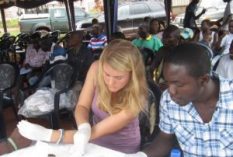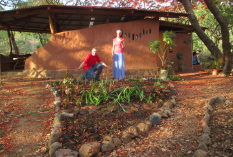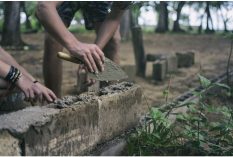Finding the right accommodation is often considered one of the most important decisions for your placement abroad. This is because whether or not you feel comfortable in your new home will greatly influence your experience of your time abroad. We have all heard the horror stories of cockroaches crawling out from under beds or roommates with impossible sleeping habits. But we also all know the amazing stories of people thriving in interesting and diverse host families or having an amazing time in an international flat share. And indeed, living in a new country is something to be excited about! As one of the most interesting adventures of your life, living abroad will allow you to discover a completely new culture and grow as a person. However, because the experience of living in a foreign country can offer you so many different opportunities, it is important for you to know what you want to gain out of your travelling experience and what kind of accommodation suits your needs best. Are you the kind of person who would like to live in a flat share with other interns and volunteers, have your own flat,live in a homestay, or live in a flat share with locals? It all depends on what you want to get out of your year abroad and what you are willing to put in.
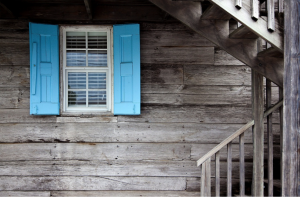
Share a flat with other volunteers
If there are other people working on your project, buddying up to share a flat is a great way to get to know each other. Travelling to work together in the morning and cooking together in the evening is a nice way to start your life in a foreign country. Living with other interns can be very reassuring, especially at the beginning. Being in a new country, working in an unknown environment, in a different culture, surrounded by a potentially foreign language, it can be good to know others who are in the same boat. As your arrival abroad and the flush of new experiences that await you can be rather overwhelming and isolating at first, it is nice to know that you are not alone. You can share your experiences, discuss issues such as culture clash, home sickness etc., experiences you are all going through, and grow together. Indeed, you get to explore all aspects of the local culture together.
However, while this is a very comfortable setup, you might find it difficult to directly mix with and integrate into the local community. By living with other international volunteers, your exposure to the new culture and language is limited. If you want to get involved, you will have to make an active effort to find other ways of integrating as it can be very easy to get stuck in an international group of friends. Moreover, it is easy to get tired of people you live and work with every single day. You might want to explore a little and meet some fresh faces.
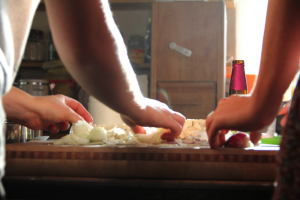 Rent your own flat
Rent your own flat
If you want to avoid arguments over who ate your cheese in the fridge, or just generally find it stressful sharing with other people, another option would be to rent your own studio or flat. This way, you do not have to take other people’s rhythms into consideration. You can come and go as you wish and live by whatever standards of cleanliness you consider reasonable without having to clear up after others or being harassed by your flatmate about kitchen surfaces. Indeed, living on your own grants you a lot more independence and freedom in your new home and enables you to mould your experience abroad as you wish. When you return home after a long day of work, there is nobody there to disturb or guilt trip you when you settle down on your bed to binge watch six episodes of that show you love. Living on your own also means that you can choose who to meet up with, lowering the risk of being in an international bubble.
But then, while you might not be part of an exclusive international community, living on your own may make it hard to establish any kind of network of contacts. Starting your placement in an entirely new country, you will start out with a very limited number of contacts, mainly work-related. Therefore, living on your own can make it quite hard to engage in the community and can leave you feeling quite isolated at times. You need to be of the more outgoing kind to meet people and create a network of friends that you feel happy and at home with in the new country.
 Live in a homestay
Live in a homestay
One way of ensuring full immersion in the new culture and avoiding the feelings of isolation you might experience at the beginning of your placement is by staying with a host family. Apart from the chance of getting cups of tea made for you in the morning and potential free slippers to wear around the house, living in a host family is the perfect way to explore a different culture as you will be entirely surrounded by it. Although your family might be able to speak English, they will speak the local language amongst themselves, allowing you to get a good taste of the language and possibly even pick up a couple of useful phrases. By participating in national holidays and festivals and experiencing as seemingly insignificant things such as the cooking routine in the house, you will learn so much about the culture at your finger tips. You might find funny little behaviours that you are not used to from your home country and grow quite fond of them. Moreover, if you are likely to feel homesick, living with a family can be a nice way to feel you belong and have a place in the new country. Your host family will also be happy to help you with all sorts of problems you might encounter along the way, be it terrible bureaucracy when you are trying to open a bank account, a confusing underground system or the best places to go for genuine local cuisine. They will also introduce you to locals, allowing you to make the most of your experience and become a part of the local community.
On the other hand, you should not forget that living with a family will put certain limits and constraints on your independence and freedom. Differently to having your own flat, you will have to abide by certain house rules and fit in to the rhythm and ways of all family members. So going out late every night might not be the best way to show your hosts your appreciation.
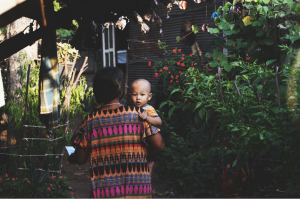 Share with locals
Share with locals
If you would prefer to not have to tiptoe up the stairs every time you have gone out for a pint, another option which could grant you a little more freedom would be to rent a room in a flat share with locals. Besides giving you a little more flexibility by living with people your age, you would be able to experience the culture first-hand as though you were a local. Your flatmates will be able to give you tips on the best places to go and take you along to evening gatherings. You will be able to make some really valuable friendships along the way too, not only with your flatmates but also other people you might be introduced to. By living with locals your age, you will get the most genuine experience of the country, learn a lot about the culture and language and potentially meet some very interesting and fun people too.
However, it might be harder to find a flat share with locals, especially if you are not in the country prior to the start of your placement. It can be difficult to choose a flat if you have never seen it or met the other flatmates. When you are just about to embark on one of the greatest adventures of your life it might be reassuring to know that after the emotional turmoil of your departure, there is a comfortable bed in a nice flat waiting for you at your arrival. Moreover, you may find that there will be a language barrier. Young people might be less patient to wait three minutes for you to complete your sentence than a mother of a toddler who does the same every day. Also, your flatmates will probably not look out for you the same way a host family would.
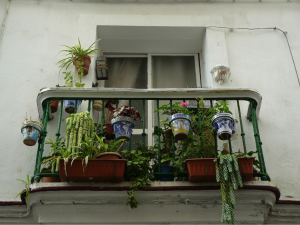
So there are lots of options of how to live when you are abroad, many of which we have not listed (including sharing a hammock with a monkey) which should be considered. Your choice of accommodation is very important, as in many ways it will mould your experience of your time abroad. Different accommodation types offer different opportunities with regards to cultural immersion and exchange, language learning, independence and many more. Does your main focus lie on the placement you will be doing or do you consider your placement to be a gateway to learning about a new culture? So put your thinking cap on, do your research and enjoy!
Global Nomadic offers 50+ Professional Internships, Volunteer Projects and TEFL Programmes in 30 countries worldwide. Now that you know what your living options are, why not check them out?
Lily Parsey is a 3rd year Arts and Sciences student at UCL with a passion for travelling and exploring cultures around the world. In the coming year, she will be undertaking a placement abroad in Shanghai. Speaking five languages, she enjoys learning languages as the key to intercultural communication.






